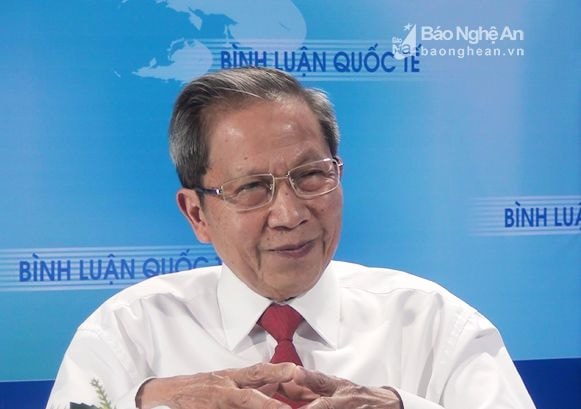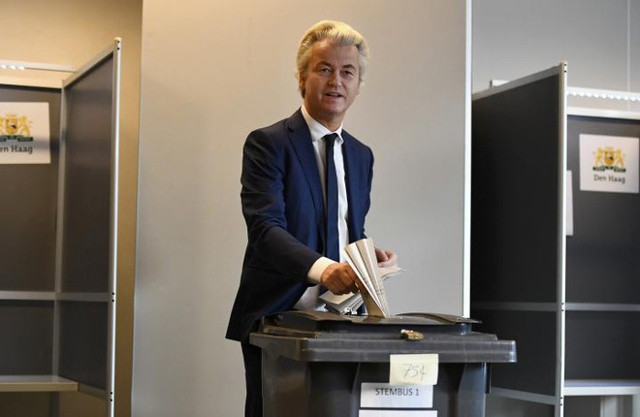General Cuong predicts the future of Europe
(Baonghean.vn) - At the end of March, the European Union (EU) will celebrate its 60th anniversary (1957-2017). European and international public opinion believes that after 60 years of formation and development, the EU is in a very serious crisis. So what is the way out for this powerful Union?
Regarding this issue, Nghe An Newspaper had an interview with Associate Professor, Doctor, Major General Le Van Cuong, former Director of the Institute of Strategy and Science of the Ministry of Public Security.
 |
| Associate Professor, Dr., Major General Le Van Cuong at Nghe An Newspaper studio on March 16, 2017. Photo by Nhat Minh. |
PV: Major General, can you provide readers with more information about the crisis the European Union is facing?
Associate Professor, Doctor, Major General Le Van Cuong:The early years of the 21st century (2000-2005) were the most brilliant period of development of the EU. In September 2008, the economic crisis in the US led to a recession of the world economy. And Europe could not escape this financial crisis storm. Up to now, the European Union is falling into a great crisis in all fields.
Economically, the EU is facing mounting difficulties: the Euro is unstable, national debt is high. The banking system is extremely “sick”. Unemployment is rising, the gap between rich and poor is widening. Economic difficulties have led to a crisis of confidence. More than 600 million Europeans no longer trust their elite leaders.
Politically and socially, Europe has never been as deeply divided as it is today. There are fierce conflicts between countries. The event on June 23, 2015, when more than 51.9% of British voters voted to leave the European Union, was like “the last straw”, creating a new political crisis.
Besides, Europe also has to face immigration crisis and anti-terrorism activities.
PV: A crisis of confidence is happening within the EU. So what is the underlying cause of this crisis, Major General?
Associate Professor, Doctor, Major General Le Van Cuong:As we know, economic globalization is an inevitable development trend. On the one hand, it brings countries closer together and cooperates with each other. On the other hand, it pushes the conflicts between countries to a higher level. For example, the four main economic pillars of the EU - Germany, France, Italy, Spain - have the view of maintaining a sustainable globalized economy together. But the countries with slower development levels such as those in Eastern Europe and the Baltics strongly oppose it. Because in the end, globalization only benefits multinational corporations, while 78% of the majority of Europe does not benefit at all. The gap between rich and poor among countries is becoming increasingly deep.
From here, anti-globalization populism was born, with the slogan “national supremacy, resolutely against international integration”. This created a deep scar in the heart of Europe. Populism is the cause that can cause the disintegration of the European Union.
PV: Recently, the President of the European Commission published a “white paper”, presenting five scenarios for the EU until 2025. Could you elaborate on this content, Major General?
Associate Professor, Doctor, Major General Le Van Cuong:On March 6, President of the European Commission Jean-Claude Juncker published a "white paper" presenting five future scenarios for Europe in the next 10 years.
Scenario one, the European Union retains 27 member states (without Britain) and introduces comprehensive economic, political and security reforms.
In the second scenario, the European Union is purely an economic union. That is, the 27 member states are in a common economic market, without political or social ties.
The third scenario proposed by German Chancellor Angela Merkel and French President Francois Hollande aims to build a “multi-level Europe”. The EU will be divided into two groups: a group of highly developed countries such as Germany, Italy, France, Spain, and a group of less developed countries such as Eastern Europe and the Baltic. Immediately, this model has met with fierce opposition. Because according to the Polish Prime Minister’s speech at the European Union Summit, this scenario will create a differentiation in the level of development between countries, and further increase the conflict.
The fourth scenario is that Europe would only cooperate on security. This would mean building a common police force, exchanging intelligence on a daily basis, and working together to fight terrorism and crime.
The fifth scenario moves towards building Europe as a federal state, which includes many independent states. I think this is an overly ambitious scenario.
In my opinion, of the five scenarios above, Europe should only build the second scenario – which is only a common economic market area. The remaining scenarios are not highly feasible.
PV: The European Union has two major relationships: EU-US and EU-Russia. Under US President Donald Trump, what will be new in these two relationships, Major General?
Associate Professor, Doctor, Major General Le Van Cuong:In terms of foreign policy, Europe is largely dependent on the United States. Under President Donald Trump, international public opinion hoped for a new change in US-Russia relations, but in my opinion, that did not happen. The EU could never go against the US in its relations with Russia. Therefore, as long as the US does not improve its relations with Russia, EU-Russia relations will remain tense.
President Trump has said that NATO is outdated. Public opinion believes that he may reduce the role of NATO. This will not happen, because NATO is the main tool for the United States to protect its interests in Europe in particular and the world in general. Thus, basically, EU-US relations remain stable as they are now.
PV: Can you give an overview of the European landscape in 2017?
Associate Professor, Doctor, Major General Le Van Cuong:2017 was the peak year of the crisis in Europe, for the following reasons:
British Prime Minister Theresa May decided to activate Article 50 of Lisbon. On March 31, Britain began talks with the remaining 27 EU member states to implement Brexit without causing a disaster for Britain. The content of the negotiations will revolve around the main issue: the EU will open its doors to British goods, on the condition that Britain must open its doors to EU citizens to work in Britain. Every year, Britain exports 400 billion pounds of goods to Europe. If both sides cannot reach a common voice, the British economy will certainly collapse.
 |
| The failure of Mr. Geert Wilders is also the failure of anti-Islamic immigration ideology and the European Union (EU). |
2017 will see three major elections in the Netherlands (March 15), France (April 23) and Germany (September). These are elections that will shake up Europe.
It can be said that 2017 was a gloomy year for Europe. An atmosphere of disintegration, division, and loss of confidence within Europe itself. Never before has Europe fallen into such a serious crisis.
PV: After Brexit, will there be a Nexit scenario, Major General?
Associate Professor, Doctor, Major General Le Van Cuong:On March 15, the far-right party failed to win the Dutch parliamentary elections. Therefore, I believe that there will be no Nexit scenario. But without Nexit, Europe will not be united. In fact, there is still a wave of wanting to leave Europe. This is a deep rift in the heart of Europe that will not be easy to heal.
Thank you, General!
America and Russia(perform)
| RELATED NEWS |
|---|

